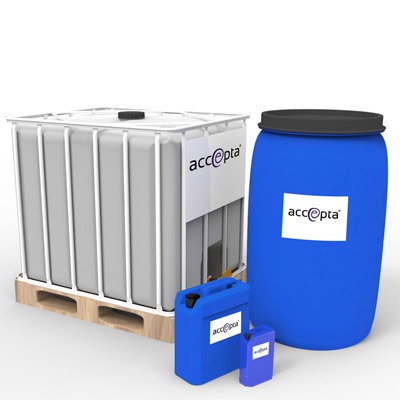PT4C / AT-2319 – Scale & Corrosion Inhibitor for Steam Boilers & Low Pressure Hot Water Systems
- Home
- Water Treatment Chemicals
- Boiler Water Treatment Chemicals
- Multi-functional Boiler Treatments
- PT4C / AT-2319 – Scale & Corrosion Inhibitor for Steam Boilers & Low Pressure Hot Water Systems
£199.00 ex. VAT
Quantity discount tiers
5-8
17%
DISCOUNT
9-16
25%
DISCOUNT
17-31
30%
DISCOUNT
32+
33%
DISCOUNT
PT4C also known as AT-2319
Prices are for 25Kg Drums/Kegs. POA for 200kg/IBCs.
Description
PT4C / AT-2319 is a high performance, blended liquid boiler water treatment based on organic tannins, polymer sludge conditioners and alkali that is scientifically formulated for the treatment of steam boilers and low pressure hot water systems.
PT4C / AT-2319 can be used with softened or moderately hard make-up, and in many instances provides a complete balanced treatment by itself. However, it can be used with other widely used conjunctional treatments to provide phosphate control and condensate system protection.
PT4C / AT-2319 controls corrosion by the dual mechanism of oxygen scavenging and the formation of a corrosion resistant tannate film.
PT4C / AT-2319 prevents scale formation by converting residual hardness salts to a mobile non-adherent sludge that can be removed by blow-down.
Product Benefits
- High performance multifunctional formulation for steam boilers and low temperature hot water systems.
- Ideal for softened or moderately hard make-up water.
- Excellent system protection by a dual mechanism of oxygen scavenging and the formation of a corrosion resistant tannate film.
Product Properties
| Appearance: | Dark brown liquid |
| pH: | ~ 14 |
| Flammable: | Non volatile |
*Full details of the product properties are available in the Safety Data Sheet. See below.
Application & Dosage Information
Accepta 2319 should be dosed initially at 1:1000, based on the system volume.
The on-going dosages should be made to maintain a tannin reserve of 12-20, and the appropriate pH and alkalinity residuals.
The actual product dosage required depends on such variables as make-up water temperature, hardness, and TDS.
It is always advisable to carry out a ‘Control Of Substances Hazardous to Health’ (COSHH) assessment before use.
For additional assistance please contact Accepta.
Safety, Storage & Handling
For full details concerning safety precautions, storage, and handling procedures for this product please refer to the latest Safety Data Sheet.
To request the latest MSDS for this product please fill out the form below.
Additional information
| Weight | 25 kg |
|---|---|
| Dimensions | 30 × 23 × 47 cm |
Description
PT4C / AT-2319 is a high performance, blended liquid boiler water treatment based on organic tannins, polymer sludge conditioners and alkali that is scientifically formulated for the treatment of steam boilers and low pressure hot water systems.
PT4C / AT-2319 can be used with softened or moderately hard make-up, and in many instances provides a complete balanced treatment by itself. However, it can be used with other widely used conjunctional treatments to provide phosphate control and condensate system protection.
PT4C / AT-2319 controls corrosion by the dual mechanism of oxygen scavenging and the formation of a corrosion resistant tannate film.
PT4C / AT-2319 prevents scale formation by converting residual hardness salts to a mobile non-adherent sludge that can be removed by blow-down.
Product Benefits
- High performance multifunctional formulation for steam boilers and low temperature hot water systems.
- Ideal for softened or moderately hard make-up water.
- Excellent system protection by a dual mechanism of oxygen scavenging and the formation of a corrosion resistant tannate film.
Product Properties
| Appearance: | Dark brown liquid |
| pH: | ~ 14 |
| Flammable: | Non volatile |
*Full details of the product properties are available in the Safety Data Sheet. See below.
Application & Dosage Information
Accepta 2319 should be dosed initially at 1:1000, based on the system volume.
The on-going dosages should be made to maintain a tannin reserve of 12-20, and the appropriate pH and alkalinity residuals.
The actual product dosage required depends on such variables as make-up water temperature, hardness, and TDS.
It is always advisable to carry out a ‘Control Of Substances Hazardous to Health’ (COSHH) assessment before use.
For additional assistance please contact Accepta.
Safety, Storage & Handling
For full details concerning safety precautions, storage, and handling procedures for this product please refer to the latest Safety Data Sheet.
To request the latest MSDS for this product please fill out the form below.
Additional information
| Weight | 25 kg |
|---|---|
| Dimensions | 30 × 23 × 47 cm |
Data Sheets & enquires
To request the safety or technical data sheets on this product or simply enquire further about chemical supply please fill out this contact form.
Contact us
Please complete this form and we will be in touch
